“Your body is not who you are. You shed it like a snake sheds its skin; leave it, forgotten, behind you” – Ep. 1 “Out of the Past”, Altered Carbon
[dropcap size=big]F[/dropcap]or eons we have philosophized on the nature of the afterlife. Scholars have debated the existence of spiritual and dimensional realms and where we go after death. But what if you could live forever, the only fall back being you have to trade in your old body for a new one? In Richard K. Morgan’s Altered Carbon, anyone with wealth, power or connections can enter ‘sleeves’ and implant memory-imprinted ‘stacks’ that contain their digitally recorded consciousness. As long as someone has access to these, they could outlive entire civilizations and historical periods of innovation.
Imagine what an existential discussion would look like if our theoretical thinkers, literary critics, and spiritualists from ages past could do what Laurens Bancroft has done: use this technology to outlive his biological limitations for hundreds of years. Ralph Waldo Emerson, Charles Darwin, William Blake, and Michael Kaku might discuss the nature of reality at one table, while Hildegard von Bingen, Mary Burmesiter, Richard Dawkins, Hermen Hesse, and Mother Teresa sit at another, discussing the divine. Perhaps Hemmingway would lounge in a corner kipping in between sips of Americano with Hunter S Thompson, who listens to the exchanges but grows tired of them. Yet, one wonders what they would all think. Would their extended lives prove fruitful grounds of progressive deliberation or become an existential parody? Would living that long really change our understanding of the universe or would it create more doubt?
Humanity’s Quest for Immortality
History tells us that we have always obsessed over our longevity. Contemplating our inevitable demise has been a subject of both fear and faith. In the Epic of Gilgamesh, the titular hero of Sumer seeks out Utnapishtim, one of the only humans to have been granted everlasting life by the gods. Gilgamesh travels there, intent on learning the secret to immortality. Zecharia Sitchin writes about Alexander the Great’s quest for the fountains of youth in book two of his Earth Chronicles. In the time of Alexander, the famous General already lived during legends recorded by Herodotus that told of the rumored long life of Ethiopians who bathed in the waters of an ancient fountain. The historian himself heard tales of it in his time, concluding that: “If the account of this fountain be true, it would be their (the Ethiopians) constant use of the water from it, which makes them so long lived.”
Zecharia Sitchin writes about Alexander the Great’s quest for the fountains of youth in book two of his Earth Chronicles.
In yogic Indian mythology and Vedic writings, the quest to claim and conquer immortality was a recurrent theme. Sometimes it was simply ascribed as a divine state of Siva. In chapter eight of Eliade and White’s Yoga: Immortality and Freedom, titled ‘Shamanistic Magic and the Quest for Immortality’, we see Durga questioning Siva: “Why is it, my Lord, that thou art immortal, and mortal am I? Advise me the truth, O Lord, so that I also may be immortal for ages.” Move forward to the Modern age and our fascination has no less diminished.
Beyond Fantasy: Living Beyond the Limits of Biology
To uncover the truths and secrets of nature, we might have to go to great lengths and visit strange places. Such plunging into the depths of the ocean to study jellyfish. We have all heard of the gecko’s amazing ability to regrow its tail, but a quarter of a century ago German marine biologist, Christian Sommer, discovered something amazing about hydras or “hydrazoans.” In 2012 NY Times ran a piece about his findings; the most amazing thing he discovered was that as they entered the final stage of their life, they could revert back to polyps. Several years later, more research was carried out by other scientists and a paper was published in the ’90s called ‘Reversing the Life Cycle.’ In it, “scientists described how the species – at any stage of its development – could transform itself back into a polyp, the organisms earliest stage of life, ‘thus escaping death and achieving potential immortality.’” Why this research is so crucial? Cell transdifferation and the hydrozoan’s reverse aging process might hold the key to prolonging life in its genomes.
…at any stage of its development – could transform itself back into a polyp, the organisms earliest stage of life, ‘thus escaping death and achieving potential immortality.’”
Medical research is already paving the way to making biological immortality a practicality. Laboratories such as those at UCLA have already grown organs in experimental conditions, including working brains and hearts. While these organoids are miniature versions of our body’s larger, more complex functional parts, the research investigates neuro-developmental and psychiatry disorders and will add to our knowledge of brain development and future treatments. In conjunction, the existence of 3D body printers could change the way we approach terminal illnesses and organ donations. This may see a rise in body shops and biological replacement factories where lung cancer sufferers will be able to order new lungs and war veterans with acquired brain injuries will be able to replace damaged cortex. Replacing whole limbs and entire bodies could also be nearer to realization than was ever thought possible.
“the way we teach – the things we teach our kids, are the things from the past 200 years – it is knowledge based. And we cannot teach our children to compete with machines – they are smarter.”
Jack Ma recently said this about the World Economic Forum about the way we educate. We will not be able to compete with machines. Biologically, we are already living in a revolutionary age where, in our lifetime, future work forces and student bases will have to compete with androids and avatars equipped with long lasting, fast learning AI.
Some believe that computerized and online learning is already transforming the role of the educator and that they will become something like a technical or behavioral supervisors that merely monitor classrooms of self-teaching children. Jack Ma says technology will never replace humans, but those facing massive redundancies and unemployment in the decades ahead may resort to cyborgism to give them an edge in the workplace. What ethical questions will this bring? Will we have to face uploading our thoughts into robotic mind-computers? Elon Musk and other futurists have already embraced the idea of cyborgism – that augmenting our biology artificially will be common practice one day. This posits the question of what will eventually happen when we undergo the transference of self to a new brain and new body. Will it involve the capturing of our unique electrical signals or energy blueprints via some as yet uncreated tool? And would the remnant digital copy of our consciousness and heart-minds loose something in the process?
But what philosophical questions will these future studies generate? Could there be a darker element that we have yet to foresee? As Takeshi Kovac says in the Altered Carbon trailer:
“The danger of living too many times: you forget to fear death.”




